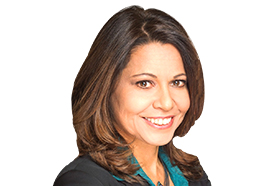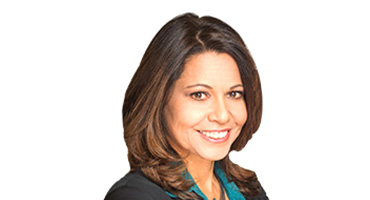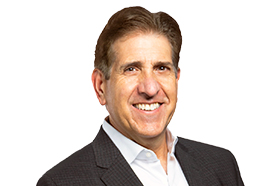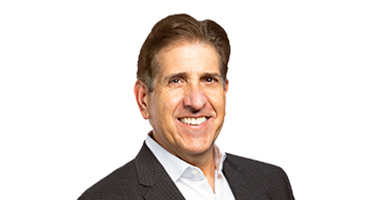The 2024 election that saw Donald Trump regain the presidency surprised many people who are close observers of U.S. politics. However, members of the media, through their work, were attuned to the mood of the American public and saw many signs that his re-election was imminent.
In a Dec. 2 discussion hosted in Grant Thornton’s Manhattan office, Grant Thornton’s Howard Homonoff, Senior U.S. Media & Entertainment Industry Advisor, talked with three prominent media figures about the meaning of the election on the industry. President of Editorial of NBC News Rebecca Blumenstein, HANG Media CEO Jon Klein and Puck Politics Reporter Abby Livingston each shared what they observed in the months leading up to the election. The three also offered insights on how the media infrastructure will likely be affected by the election and what “the news” really is in a media landscape dominated by social media platforms and podcasters.
The transcript below contains the highlights of this 70-minute discussion.
Deborah: My name is Deborah Newman and I lead our media and entertainment industry for Grant Thornton. Thank you for being here this evening.
Kevin: Good evening, Kevin Dawson, I’m the co-captain of our technology industry here at Grant Thornton. I think we have a great panel and we're excited about it.
Assessing 2024 election results
Howard: I'll start with you, Rebecca. Where would you start in terms of what just happened [in the election] and, as best you can, why?
Rebecca: Much like in 2016, the economic dislocation of this country is something that continues to be a dominant theme, a dominant struggle. There are millions and millions of people who are working to even get a job that pays $50,000 a year. Many of them are working two or three jobs and we had one candidate here who spoke to them brilliantly. The election is really quite stunning in its clarity. [But] I think we can make a mistake by thinking that everyone is on one side or the other, when the vast majority of Americans still are middle-of-the-road and will continue to swing election to election.
Howard: Jon, what do you think just happened and how do you think about it?
Jon: I think we're in the middle of a social revolution, clearly a technological revolution. There's been more invented in the last 10 years in terms of processing power and its applications than in all the rest of our history today. That is very disconcerting to a lot of people but starting with the losers in that equation and it's the people in Bay City, Michigan, and all those swing states, who lost jobs that are never going to come back. And they feel that pain. And we on the coasts don't feel it as readily, necessarily, but we're starting to see it as well.
Howard: Abby, from where Puck sits, how do you think about what just happened?
Abby: [Our perspectives at Puck are] based on where we came from, we all came from different places. I come from acting for broadcast television as a producer, and then migrated over to print.
With regard to the election, my perspective was that I thought things looked healthier for the Democratic Party than they actually were. But I did kind of have a sense that the states were all going to fall together, battleground states, and they ended up doing that. The morning after the election, I flew to my hometown of Fort Worth, Texas, which is the most average … a wonderful town, but it is a normal, normal town … and I come straight from the airport. My sister got me out at the Walgreens and I buy two very basic toiletry items, and it was $32. I would have been shocked if it was $32 in New York, I was shocked that it was $32 in Fort Worth and I was like, “That's the answer. That is the answer.”
Howard: We’ve certainly seen what happens to incumbents in other places in the world. Rebecca was this was what happened here?
Rebecca: Since the financial crisis we have seen a sweeping of incumbents, and obviously inflation, a sense of globalization working against working people that has swept the world and continues to. But I think that something very specific happened here in America, and I think we need to embrace the fact that in the Democratic Party there was a feeling that demographics is destiny, and that with a changing electorate that the Democrats would really have a lock on various demographic groups that were growing.
We really had a unique lens at NBC because we own Telemundo and did specific polling from, whether it's CNBC or Telemundo, and we really did start to see a fraying of this kind of block of voters that quite frankly, I think the Democrats took for granted. The [more] unifying factor is under $100,000 a year and people who probably weren't college educated. I spoke at my high school commencement [in Michigan] a few years ago and no one was going to four-year college. And this is a town of smart kids and stable families. Ann Arbor, where I went to school, is less than 100 miles away, and I said to the college counselor, “What happened here? What's going on?” And he said, well, Rebecca, no one can afford to go to college here anymore. In-state tuition in Michigan is $20,000 a year.
And so, it comes down to like this very fundamental thing like are your kids going to be better off than you are? And these are smart people, and they know that their kids, frankly, are not [better off]. And I think that I agree with the “revolution” comment — to look at this as anything but a very bracing moment in America for both parties is a mistake.
Covering the campaign: How is this changing?
Howard: How important were all the [campaign] tactics versus the much bigger [economic] trends and how do we think about balancing coverage in media of both the day-to-day and the big picture?
Rebecca: NBC News reaches more Republicans than Fox News does, and we have more red viewers, purple viewers, blue viewers than anyone. We have evolved on to streaming on to digital, where we're regularly keying the times but we still take this mission of free trusted news very deeply because not everyone can afford to subscribe to cable, to a news site. It’s a great thing that there's a proliferation of lots of new media and voices here. But I think that we underestimate how much people still rely on trusted news sources and broadcast.
Jon: And I think trust is the key word. It used to be that trusted person was someone you knew personally, so you could weigh their information within the context of who they were. But now social media has made that trusted person a stranger. It's Ben Shapiro helping me, or it's Rachel on her podcast. Or it’s whoever. That's why I believe what Pod Save America says. They told me to think this, so that's what I think. And that's the media environment that we're living in, where suddenly the trusted sources are not just Lester Holt - it's very diffuse.
Howard: Abby, [at Puck] you're trying to cover territory much like NBC News does but you have to do it on a smaller scale. What is your audience like, and how do you find people that aren't just wanting to get reinforced on a particular ideological point of view?
Abby: The person who drew me into [the news business] was (former Meet the Press host) Tim Russert, and I ended up working in the [NBC News Washington] bureau. His whole motto was, “Take everything you can learn about that person's position and take the opposite side when you do a live interview.” And so that's the culture I came up through. It was maintained when I worked for Jon [Klein] at CNN.
And then I went to Roll Call, and then I was at the non-profit Texas Tribune. Then I get to Puck and it's kind of a bit of all of them and we have no political position. Puck has a very intense fan following. When someone subscribes to your news organization, that's a commitment, and they're coming to you as a reader in good faith. I've been pleasantly surprised with the interact[ion] with readers. Even when they're mad at me, I know that they're coming at me because they care about Puck and they want Puck to be as good as it can be.
Rebecca: I would just add to that, I completely agree that there is a freedom and the value of reporting, and that's what you see on Puck, and that's what you see in, a quality, trusted news organizations.
I think what we're trying to do every day [at NBC News], we're not a subscription site, but we're trying to combine the best of TV, the best of digital — and the original reporting is just a huge part of it. You need the original interviews. We broke last night the story that Joe Biden was pardoning his son Hunter and we were on with it 1/2 an hour to an hour before other people. That story took months of work, many, many denials from the White House, but I still think that there is a huge premium in being first to a story, being trusted. As we evolve, we know that broadcast is still very strong. Is it going to grow like it used to? No. So we have streaming, we have digital, we have TikTok and we view it as our obligation to evolve and [to continue to] break news and to deliver to all of you interviews that will that will help inform you of the choices you have to make.
Jon: We’re living in a country that is pretty underinformed despite the amount of information that's available, and almost hostile to information that they don't believe comes from the right source. And so, mainstream organizations have to have a commitment to actually covering what's going on, getting away from the horse racing stuff and more into the impact of these policies on your real life. Why is that bread $2 more where you live instead of over there? And what is this guy going to do about it?
News in a multi-platform environment: From TV to TikTok
Howard: Rebecca, I can't remember the last time I had a student who wasn't living with their parents, who subscribed to multi-channel video, right? They’re getting their news on whatever variety of platforms and from creators they trust. [This is] way outside of what we think of as the news business. How do you, steering a big ship and trying to maintain the brand and integrity, of this good ship at NBC News, and yet speak to people that are scrolling through NBC News's TikTok, where you're right next to something like Taylor Swift, or some other the celebrity. How do you play at both of those? Speak to, such a broad variety of audiences?
Rebecca: It’s an excellent question and, you know, I was in print digital media for many years and have jumped over to television. And I think there's been an urgency across all of media to reinvent ourselves. And these two industries, print and television, for way too long, have been entirely separate. We are fortunate to have a really great website that is populated by tons of original journalism. There's kind of an advantage in that. Traditionally, it had nothing to do with TV because there were silos, and what we've done is getting them to work together and we are just breaking news and we're pretty scrappy and hungry.
My boss, Cesar Conde (Chairman, NBCUniversal News Group), made a very smart bet on streaming three years ago. He did it at a time when a lot of people were charging for streaming services. He made a bet an on ad-supported model for streaming and it was a very prescient bet. And so, fast forward, we now have NBC News Now, which on the NBC News app is just streaming constantly. It's free. It's delivering quality information literally in your pocket. It’s a little bit different than broadcast, it's a little bit more approachable. NBC News Daily is the largest audience on all of daytime television and a lot of political hits playing on the Hill. It’s gaining a lot of influence and it's getting many more young people. We also are doing a similar thing with TikTok, and where we're finding a lot of success in doing original video for TikTok of our most trusted people. Steve Kornacki just gets millions and millions of views on TikTok.
We have to work really hard to meet [young people] where they are, through our app, through streaming, it's (what) we call a flywheel strategy. And what's really interesting is that as digital is rising and as streaming is rising, our ratings on broadcast with The Today Show are rising as well.
One final thing is that I think it's really important that people come to NBC wherever they are. I think sometimes we tend to say, you know, if you're not watching a documentary or something that you don't care about the news. But however people want it, we need to be working very hard to give it to them.
Technology’s impact on politics and news
Howard: Jon, you have been at the pinnacle of the quote, “legacy news” media business. You have been a serial [technology] entrepreneur. What are you seeing about the technology changing that’s going to affect what campaigns do? And what does that mean for the people here and what they cover?
Jon: I ran an AI platform for media that Apple acquired a couple of years ago, so I got an early introduction into all that's possible, AI [is] the big tectonic shift. It has potential for good and for ill. I obviously think you can develop a much more precise targeting capability than ever before to hit exactly the person you want to reach with exactly the message they love so much, and just pound away at that repeatedly so it can build even deeper silos.
On the other hand, for good, AI is really all about seeing how things connect in way[s] that we can't. And we noticed that there were a lot of commonalities among people who you might have thought were very different. Before [the AI business] I also ran a subscription video platform for big personalities with rapid fan followings and our first client was Sarah Palin. And we did a lot of deep research into her followers, and we saw that they had, one of their big commonalities, was intense economic insecurity. And when we looked for: OK, well, who else could merge on other channels could we watch that we could promote on her channel? Bernie Sanders followers? Same profile, economic insecurity. So that sort of tells you if the message itself were stripped of the opprobrium and the demonization, if you if you just focus on the actual core messaging, you could pull people together in a way that you never would have thought possible.
I think that that holds out a lot of hope for the deployment of AI, to actually help eradicate the silos. It could be wrong — that's important for a news organization — but it can make sense of the world, of complex issues, in a way that other outlets can’t. The question is, how do we shape it so that it's digestible and so that it reaches people who will respond?
Rebecca: So much of the election was visual and on video, whether it was the debate, whether it was the interviews, whether it was the image of President Biden walking down the stairs on the plane. These are the things that we remember and that jogged our consciousness of like, “Oh my God, something big is happening here.” It is the through line and the importance of visuals, along with great journalism. We [now] have a president who has, come from TV, and I think we're going to continue to see more of this. But it just continues whether it's covering a hurricane or bearing witness, or war and politics, that [visuals] are an important through-line, whatever platform you're talking about.
Jon: Can I build on that for just one second? Thirty years ago, I was executive in charge of 60 Minutes and Don Hewitt, the legend — I was at 35 and he was 75 and I was scared of him. I finally got up the nerve to ask him, like, “Don, how? How could 60 Minutes be the most watched show in the history of all of television” (it still is) “when it’s so visually simple?” And he, without missing a beat, he said, “Oh, because television is not a visual medium. Now it's a vehicle for bringing us together. We're probing each homo sapiens to read each other's faces.”
That's how we're programmed, and I think we're seeing that in social media. It's the sense of connection. But we have the opportunity to connect more. Question is, what do we do with that?
Protecting journalism and journalists
Audience: This is the first time that we've gone into a new presidential administration talking about going after [presidential] enemies. Are you guys preparing for this?
Rebecca: I appreciate the question and certainly the value inherent in it that you place in journalism. And I would just say that for most of us it is going to be a long race and endurance contest. This primarily is just a massive story to cover, where everything is changing. And the biggest answer to a big story,
“What are you going to do and how are you going to do it?” is more journalism and better journalism.
I am lucky enough to work in a company with lawyers and support for journalists, and I think that in journalism, there are various committees, The Committee to Protect Journalism, The Reporters Committee to Protect Journalists. I'm sure of the Columbia Journalism Review. There's a lot of talk of how to support journalists and journalism at a moment to protect them. Rather than panicking our best antidote is just to cover it and to do our jobs. And if things evolve where we need to rethink that or get support, I'm pretty confident that it'll be there, because a lot of people recognize the importance of journalism, of the Fourth Estate, especially in a moment like this, and that’s something that really buoys us.
Abby: I think about it probably 100 times a day. I think about my correspondence, how I communicate with people. I about the Capitol Hill Press Corps. Imagine your workplace, the place you've been, that you have a desk but [on Jan. 6, 2021] it's completely taken over by vandals who wanted to kill your friends. This was a profoundly horrible event that the rest of America doesn't seem to care about or acknowledge or remember.
Washington has always been the glamorous beat. And I think it's now a hardship. I think it's a very tense time to be there. I think it's exhausting. I had to take 10 months off in 2021 because I was just that exhausted
Audience: At the beginning of this session, you talked about difficulty, economic hardships, difficulty in every one election. At some point, you have to make people's lives better. And that's not a simple equation in this country.
Rebecca: I think that during most elections, the election is over, and the story goes to Washington, and the rest of the country moves on. This [is now] very much going to be a story throughout the country. There will be deportations in many cities across the country. There will be impacts with the Department of Education, tariffs, and manufacturing, and we very much intend to cover the impact, the fallout and also be open to the fact that there could be some good ideas here as well. But it very much, it feels to me a very different script than usual where the campaign is done and that's Washington's job.
Abby: I'm not breaking any news here, but the guardrails are going to be the gone. I think a lot of voters thought it would be more like the first Trump administration, and I don't think it will be so.
Howard: One last question and then we'll wrap here.
Traditional news’s future vs. its digital counterparts
Audience: So much has been made about the demise of the mainstream media and the rise of social media as the way that everybody's getting their information. You have people that are leaving traditional news organizations and going to social media-type news organizations. How do you balance those two competing interests: go to NBC, read Puck, or go to HANG Media?
Jon: I think you have to acknowledge that those are the habits of most consumers now, not just those young kids of ours. Everybody has a short attention span. It starts with acknowledging that audiences today, more and more they expect to be part of the equation. They want to comment, they want to ask questions themselves. And to touch on something Rebecca noted a little earlier, they expect authenticity. Steve Kornacki is such a hit in in the streaming world and on social because he's just being him. It's like, it's that whole thing really works. Where Kamala and that campaign felt short is they did not come off as authentically. And Trump went on all these podcasts, and he was loose, he was comfortable, and he was himself. Love him or hate him, he was himself. And being yourself is going to count for a ton. That is our current media and where media is going.
Rebecca: I appreciate the Kornacki comment because I think that there's really something there, it’s behind the scenes. It’s the khakis, it’s the fact that this person is not trying to sell me down the river. He's giving me accurate information and he's doing it with a board in a way that's compelling and it breaks it down and explains it to me and it's not trying to make me feel stupid.
And in the face of climate change, local meteorologists, I think in my former world, people really looked down on local television. It's like, Oh my God, that's not really news. There's no real local news left, and I just find it to be so elitist in a way, because there's local stations around the country who work so hard to deliver. It may just be traffic and weather, but if you look at any measure of trust, it is in local television stations. We have to meet people where they are in terms of engagement and not look down on them and not make judgments and give them information that's useful to them. And if we can do that, I think we'll go a long way in ensuring that audiences trust us and what are certain to be tumultuous times.
I think that what The Daily [from the New York Times] does so successfully, what I try to do on our call every morning, is get the editors out of the way and just listen to a reporter talk about how they did this story and what drew them to the story and what was a challenge in the story and the story behind the story. And people love that. And we need to do whatever we can to take the veil away from some of the polish and do stories that are accessible to people.
Jon: With multimodal AI, those video reports can turn into text and vice versa. They can turn a text story into an audio podcast. So that could be a real great flowering of excellent journalism.
Abby: I think viewers and consumers are much more sophisticated now than 10, 15 years ago and they know what's going on there. I don't necessarily always agree with Joe Rogan's approach on facts, but he does get something interesting out of the person. I think if [someone is] going to run for President in four years, you've got to be able to go into these places and answer, get fresh answers. I think we're going to see a complete revolution in how politicians engage with the public.
Howard: I think that's a pretty big picture note to finish on. Thank you to my terrific panelists. We do these events in the spring and in the fall and look forward to seeing you guys in the future.
Contacts:



Head of Media & Entertainment Industry
Grant Thornton Advisors LLC
Deborah Newman is the Head of the Media & Entertainment industry based in the Los Angeles office.
Los Angeles, California
Industries
- Technology, Media & Telecommunications
- Media & Entertainment



Senior U.S. Media & Entertainment Industry Advisor
Grant Thornton Advisors LLC
Howard Homonoff serves as Senior U.S. Media & Entertainment Industry Advisor for GT. Howard has been a leading executive, lawyer and strategic advisor in the media business for over 20 years.
New York, New York
Industries
- Media & Entertainment
Content disclaimer
This Grant Thornton Advisors LLC content provides information and comments on current issues and developments. It is not a comprehensive analysis of the subject matter covered. It is not, and should not be construed as, accounting, legal, tax, or professional advice provided by Grant Thornton Advisors LLC. All relevant facts and circumstances, including the pertinent authoritative literature, need to be considered to arrive at conclusions that comply with matters addressed in this content.
Grant Thornton Advisors LLC and its subsidiary entities are not licensed CPA firms.
For additional information on topics covered in this content, contact a Grant Thornton Advisors LLC professional.
Trending topics

No Results Found. Please search again using different keywords and/or filters.
Share with your network
Share